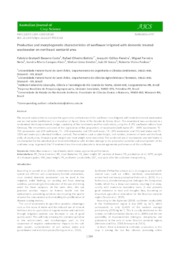Productive and morphogenetic characteristics of sunflower irrigated with domestic treated wastewater on northeast semiarid area.
Productive and morphogenetic characteristics of sunflower irrigated with domestic treated wastewater on northeast semiarid area.
Autoria: COSTA, F. G. B.; BATISTA, R. O.; PEREIRA, J. O.; FERREIRA NETO, M.; ALVES, S. M. C.; SIMOES, W. L.; SOUZA, L. di; PODEUS, R. V.
Resumo: The present study aimed to evaluate the agronomic performance of the sunflower crop irrigated with treated domestic wastewater and normal water (well-water) in a inceptisol of Apodi, State of Rio Grande do Norte, Brazil. The experiment was conducted in a randomized block experimental design, consisting of five treatments and five replications, using the H-251 sunflower cultivar from Embrapa. The treatments consisted of the application of five proportions of wastewater/well-water (T1 - 100% wastewater; T2 - 75% wastewater and 25% well water, T3 - 50% wastewater and 50% well-water, T4 - 25% wastewater and 75% well-water and T5 - 100% well-water plus chemical fertilizer, control). The variables such as plant height, leaf number, diameter of stem and the head, yield, oil production, thousand-grain weight and head weight were evaluated. The combined use of wastewater and well-water is an alternative for the substitution of mineral fertilization with minimal damage to the productive potential and development of the sunflower crop. In general, the T4 treatment was the most adequate to improve agronomic performance of the sunflower.
Ano de publicação: 2018
Tipo de publicação: Artigo de periódico
Unidade: Embrapa Semiárido
Observações
1 - Por padrão são exibidas publicações dos últimos 20 anos. Para encontrar publicações mais antigas, configure o filtro ano de publicação, colocando o ano a partir do qual você deseja encontrar publicações. O filtro está na coluna da esquerda na busca acima.
2 - Para ler algumas publicações da Embrapa (apenas as que estão em formato ePub), é necessário ter, no celular ou computador, um desses softwares gratuitos. Sistemas Android: Google Play Livros; IOS: iBooks; Windows e Linux: software Calibre.
Acesse outras publicações
Acesse a Base de Dados da Pesquisa Agropecuária (BDPA) para consultar o acervo completo das bibliotecas da Embrapa.

